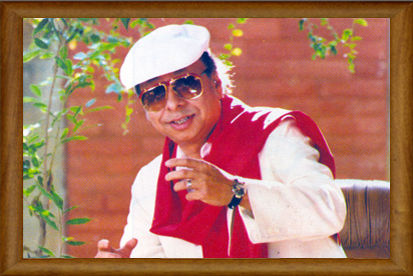It is a curious thing that R D Burman also goes by the name of Pancham. Story goes that when veteran
Ashok Kumar saw
Sachin Dev Burman's newborn uttering the syllable 'Pa' repeatedly, he nicknamed him Pancham. And the name stuck. To many, he's still Pancham Da. The man who added his unique dash of pep and verve in to Hindi film music starting with the 60s. The first music director who added a pinch of Rock 'n' Roll to lilting Hindi tunes, and created a brand of music so distinctly his own, that even his father, the older Burman came to be proud of his son's unconventional music.
Rahul Dev Burman was born on 27 June 1939. To him, music came easy and early. He learnt to play the Sarod from the legendary
Ustad Ali Akbar Khan at very young age. He also played the mouth organ. When he was nine years old, he composed his first song, 'Aye Meri Topi Palat Ke Aa..', which was later used for the film Funtoosh and the very next year, his father borrowed the tune of 'Sar Jo Tera Chakraye..' for the Guru Dutt film Pyaasa. The first film the younger Burman scored music for was Mehmoood's Chote Nawab in 1961 and the first song in the film was to be recorded was by
Lata Mangeshkar. The film marked the reconciliation between
S. D. Burman and
Lata Mangeshkar who had stopped recording together six years ago.
Vijay Anand can be credited with bringing about R D Burman's first big break. He arranged a music session for the youngster before Nasir Hussain commenced the production of Tesri Manzil. Shammi Kapoor, who heard RD's tunes, is said to have screamed 'Yahoo' in sheer appreciation while Nasir Hussain signed the young composer for six of his forthcoming films. At that time, he would not have known that the breathy 'Aaja Aaja..' would become one of the best seduction songs ever! R D Burman's constant efforts to break musical typecast and explore new possibilities came through in the music that he made. Be it the poignant tunes of Kati Patang, the love songs of Pyar Ka Mausam, the fun numbers from Padosan or the soulful melodies of Amar Prem, Pancham had done them all. While making music was his profession, singing always remained R D's passion. He sang occasionally and when he did, it was never went unnoticed.
Though he did as much justice to serious tunes as he did to the light numbers that he sang, the groovier tunes always gained more popularity. Though Asha Bhosle is remembered for the legendary cabaret 'Piya Too Ab To Aaja..', the wild cry of 'Monica O My Darling' belongs to R D Burman. Mohammed Rafi sang the zany number 'Yamma Yamma..' together with RD. The composer also sang the sizzling 'Mehbooba Mehbooba..' for Sholay picturised on Helen and Jalal Agha. He however, did not record too many duets with Asha Bhosle who was by then the love interest of his life too. The high-pitched, outlandish 'Duniya Mein Logon Ko Dhoka Kabhi Ho Jaata Hai..', is one of their best remembered duets. A large number of renowned film-makers like Shakti Samanta, Nasir Hussain, Ramesh Bhel, Dev Anand and Gulzar went back to Pancham repeatedly for musical sustenance. The Gulzar - Pancham team gave us a large number of memorable melodies. Gulzar is full of fond remembrances of his dear friend. The songs of Gulzar's films were always special. Together they worked for the film Parichay for the first time in 1972. 'Musafir Hoon Yaaron..', 'Naam Gum Jayega.', 'Aaj Kal Paon Zamin Par Nahi..', 'O Manjhi Re..', 'Phirse Aaiyo Badra Bidesi..', 'Mera Kuchh Saaman..', 'Koi Nahin Hai Kahin..', 'Silli Hawa Chhoo Gai..' are some of their best songs. From the knowledge of Indian ragas to a keen interest in American jazz, RD's musical interests stretched from 'ear' to eternity. He firmly believed that every composer must have knowledge of all kinds of music before he can dream of becoming accomplished in his field. For RD the quest for the perfect tune was never a burden. Every film and situation rang true in his ears. He could translate the feelings behind the words in musical form without a hitch.
As far as winning awards went, R D did not get a fair deal. Though he delivered umpteen hits in the three decades that he made music, his contemporaries and even juniors walked away with more awards than he did. Nevertheless, he is credited with being the only music director to have contributed phenomenally to radically to vastly different genres of music spread across thirty long years. He passed away in 1994 and after scoring the music of 1942 A Love Story, which ironically won him his third and final Filmfare award. 
